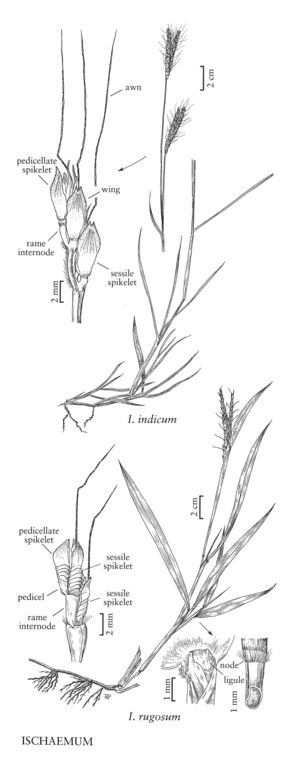Ischaemum indicum
Plants perennial, forming loose clumps. Culms 20-90 cm, decumbent, often rooting from the lower nodes; nodes antrorsely pilose; internodes glabrous. Leaves crowded towards the base; sheaths open, sparsely to densely pilose; ligules about 1 mm, membranous; blades 4-15 cm long, 3-8 mm wide, pilose on both surfaces. Inflorescence units with 2 rames; rames 3-5 cm long, 4-5 mm wide; internodes 3-4 mm long, 0.5-0.7 mm wide, slightly triquetrous. Sessile spikelets 4-5 mm long, 1.2-1.5 mm wide; calluses strigose; lower glumes coriaceous below, thickly membranous above, rough but not rugose, 5-7-veined, 2-keeled, keels narrowly winged; upper glumes 1-keeled, keels winged distally, awned, awns 1-1.5 cm; anthers 2-2.5 mm. Pedicels 2.5-3.5 mm, ciliate on the edges. Pedicellate spikelets slightly smaller than the sessile spikelets. 2n = 36.
Distribution
Md., Pacific Islands (Hawaii)
Discussion
Reed (1964) reported finding Ischaemum indicum growing on chrome ore piles in Canton, Maryland. This reported introduction has not been verified.
Selected References
None.
